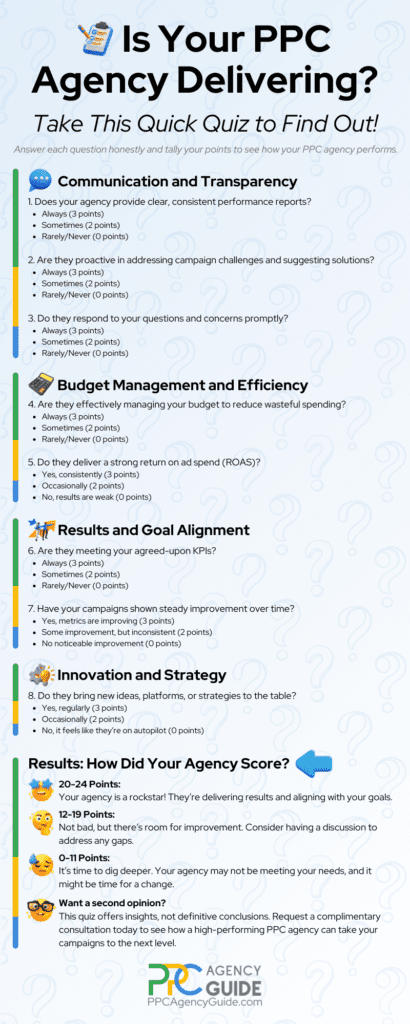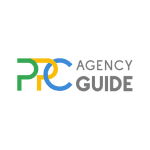
You hired a pay-per-click (PPC) agency to grow your business, but are they delivering? Partnering with an agency is a significant investment, and it’s essential to ensure they’re driving the results your business needs to thrive. From hitting key performance indicators (KPIs) to managing your budget effectively, a reliable agency should feel like an extension of your team, not just a vendor. But how do you evaluate their performance objectively? In this guide, we’ll explore the key metrics, communication practices, and red flags that help you measure whether your PPC agency is truly delivering on their promises or if it’s time to make a change.
Defining Success: What Do You Expect from Your PPC Agency?
Before you can measure the performance of your PPC agency, it’s critical to define what success looks like for your business. This step sets the foundation for evaluating their work and ensures both you and your agency are aligned on goals.
Start with Your Business Goals
Your PPC campaigns should directly support your broader business objectives.
- Drive More Leads: Generate a steady stream of potential customers for your sales team to nurture.
- Increase eCommerce Sales: Boost online transactions and revenue through targeted campaigns.
- Boost Brand Awareness: Ensure your business stands out and remains top of mind with your audience.
- Improve Customer Retention: Focus on strategies that keep customers coming back and maximize their overall value.
Define Key Performance Indicators (KPIs)
Once your goals are clear, translate them into measurable metrics, like:
- Click-Through Rate (CTR): Are your ads capturing attention?
- Conversion Rate (CVR): Are clicks turning into sales or leads?
- Cost Per Click (CPC): Are you paying too much for traffic?
- Cost Per Conversion: Is your ad spend delivering ROI?
These KPIs give your agency clear targets and make it easier to assess whether they’re delivering on promises.
Set Expectations Early
To avoid misalignment, discuss the following with your PPC agency upfront:
- Expected Timeline: It usually takes a couple of months before your campaigns perform well.
- Budget Allocation: Are you targeting the right platforms and audience segments? While Google Ads is often the default, exploring alternatives like Microsoft Bing Ads can uncover lower-competition opportunities and better cost efficiency in certain industries.
- Campaign Strategy: Does it reflect your industry’s best practices and trends?
Document the Plan
Treat your PPC agency like a strategic partner. Collaborate on a plan that includes:
- Short-Term Goals: For instance, a 15 percent increase in conversions in three months.
- Long-Term Objectives: For instance, steady ROI growth year-over-year.
A clear, documented plan ensures both sides stay accountable and reduces the risk of miscommunication.
Key Indicators of Agency Performance
Once you’ve defined success for your PPC campaigns, the next step is evaluating how well your agency delivers on those goals. It’s not just about the numbers. They should also demonstrate clear communication, effective strategies, and proactive problem-solving. Let’s break it down.
Transparency in Reporting
A good PPC agency provides detailed, easy-to-understand reports that go beyond basic metrics like CTR or CPC. Look for:
- Granular Data: Performance by campaign, ad group, and keyword.
- Insights: Explanations of what’s working, what’s not, and why.
- Actionable Recommendations: Suggestions for next steps or optimizations.
For example, if your agency presents a report showing a 20 percent drop in conversions, they should also include the reason, such as a competitor outbidding your keywords, and a plan to resolve it, like refining your targeting or improving ad copy.
Transparency Red Flags
- Vague Summaries: Reports that lack detail or only provide surface-level insights.
- Inconsistent Reporting Schedules: Reports are late, irregular, or missing entirely.
- Lack of Account Transparency: Hesitation to share account access or raw data, which can signal poor accountability.
Goal Alignment and KPI Achievement
Your agency’s performance is directly tied to how well it meets the KPIs you’ve established. Evaluate:
- Consistency: Are they delivering results month after month, or are there erratic fluctuations?
- Adjustments: Are they refining campaigns based on performance?
- Milestone Tracking: Are they hitting the short- and long-term goals outlined in your plan?
Tip: Request a quarterly review meeting to discuss whether your KPIs need to evolve as your business grows.
Proactivity and Innovation
A top-performing agency doesn’t just follow your instructions. They bring fresh ideas and strategies to the table.
- Staying Ahead of Trends: Are they experimenting with new platforms like TikTok or leveraging emerging ad formats like responsive search ads?
- Addressing Challenges: Do they come to you with solutions before you even notice a problem?
- Creative Campaigns: Are they A/B testing ad creative and pushing boundaries with messaging?
Responsiveness and Communication
The best agencies act as an extension of your team. Evaluate how well they communicate:
- Timeliness: Do they respond to emails and calls promptly?
- Clarity: Do they explain complex PPC strategies in a way you can understand?
- Collaboration: Do they involve you in decisions and incorporate your feedback?
Budget Management and Efficiency
Your PPC agency should maximize every dollar spent. Assess:
- Cost per Acquisition (CPA): Are they lowering costs without sacrificing quality?
- Ad Spend Allocation: Are they prioritizing high-performing campaigns or wasting money on poor performers?
- Improved ROI: Is the return on your ad spend steadily increasing?
Communication and Collaboration
A strong relationship with your PPC agency depends on clear, consistent, and effective communication. The best agencies treat you like a partner, ensuring you’re informed, involved, and confident in their strategies.
What to Look For
- Responsiveness: Do they reply to your emails or calls promptly, especially during critical campaign periods? A delay in communication can lead to missed opportunities.
- Clarity: Do they explain strategies and performance metrics in a way you can easily understand? Avoid agencies that rely on jargon or leave you guessing about what’s happening.
- Collaboration: Are they open to feedback and actively involve you in decision-making? While they are the experts, your input should always be valued.
Examples of Effective Collaboration
- Weekly or Monthly Check-Ins: A good agency schedules regular meetings to review performance, answer questions, and discuss the next steps.
- Proactive Updates: They reach out with solutions when issues arise rather than wait for you to notice a problem.
- Shared Tools: Some agencies use project management platforms or shared dashboards to keep communication and campaign details transparent.
Communication Red Flags
- Poor Responsiveness: If they frequently miss calls or delay responses, it may indicate a lack of priority.
- Dismissive Attitude: An agency that brushes off your concerns or avoids incorporating feedback isn’t truly collaborative.
- Unclear Communication: Reports or updates that confuse rather than clarify make it harder for you to stay informed.
Budget Management and Efficiency
Your PPC agency’s ability to manage your budget effectively can make or break your campaigns. A top-performing agency maximizes every dollar spent, ensuring you get the best results without unnecessary waste. Here’s how to evaluate their performance in this area.
Key Metrics to Assess Budget Management
- Cost Per Acquisition (CPA): Are they delivering conversions at a reasonable cost? A lower CPA means your budget is being used efficiently to generate leads or sales. For example, if your CPA goal is $50, and your agency consistently achieves $45, they’re doing a great job.
- Return on Ad Spend (ROAS): Are you seeing a solid return on every dollar invested? A ROAS of 4:1, for example, means you’re making $4 for every $1 spent—an indicator of effective ad spending.
- Cost Per Click (CPC): Are they keeping your CPC competitive without sacrificing quality? While low CPC is good, it shouldn’t come at the expense of reaching your ideal audience.
How to Evaluate Efficiency
- Budget Allocation: Are they prioritizing high-performing campaigns, ad groups, or keywords? Shifting resources to what works best shows they’re optimizing your budget.
- Audience Targeting: Are they narrowing your targeting to reach the right audience? Broad targeting might bring in clicks, but they won’t necessarily convert.
- Avoiding Wasted Spend: Are they actively identifying and cutting out wasteful expenditures? Negative keyword strategies, geotargeting, and ad schedule adjustments are essential here.
Budget Management and Efficiency Red Flags
- Overuse of Generic Keywords: If your budget is being spent on keywords that are too broad or not directly related to your business, you could be losing money.
- High CPC Without Results: Paying a premium for clicks that don’t convert indicates inefficient management.
- Failure to Optimize: If your campaigns run on autopilot without consistent improvements, your agency isn’t maximizing your budget.
Long-Term Value Creation
A truly exceptional PPC agency doesn’t just deliver short-term wins. They focus on building sustainable, long-term success for your business. This means developing strategies that evolve with your goals, adapt to market changes, and continue delivering results well into the future.
How to Measure Long-Term Value
- Trend Analysis: Are your campaigns showing consistent improvement over time? An agency focused on long-term value will aim for steady growth in metrics like ROI, ROAS, and conversion rates.
- Scaling Campaigns: Is your agency scaling successful campaigns to reach new audiences or markets? Growth requires them to adjust strategies to support your evolving needs.
- Audience Refinement: Are they continuously learning from data to refine audience targeting? Over time, your campaigns should zero in on your most profitable customer segments.
Key Components of Long-Term Strategy
- Focus on Customer Lifetime Value (LTV): Rather than just driving single purchases, an effective agency will aim to attract customers who deliver high lifetime value.
- Adapting to Industry Trends: PPC is constantly changing. Agencies that stay ahead of the curve by adopting new ad formats, leveraging automation, or exploring emerging platforms ensure your campaigns don’t stagnate.
- Balancing Short-Term and Long-Term Goals: While quick wins are important, they shouldn’t come at the expense of building a sustainable strategy. For instance, focusing solely on low-cost clicks might hurt brand quality or long-term customer acquisition.
Red Flags That Undermine Long-Term Value
- Stagnant Campaign Performance: If your metrics plateau without any signs of growth or innovation, the agency might not be thinking long-term.
- Over-Reliance on One Strategy: Agencies that fail to diversify campaign approaches risk leaving you vulnerable to market shifts or algorithm changes.
- Neglecting Retention Strategies: If they’re only focused on driving new customers but not on retaining existing ones, they’re missing a critical opportunity for value creation.
Evaluating Red Flags and Making Changes
Even the best PPC agencies may occasionally fall short in certain areas, but consistent underperformance or mismanagement can hurt your campaigns and your bottom line. It’s essential to recognize red flags early and know how to address them effectively.

Common Red Flags to Watch For
- Inconsistent Reporting: Regular, clear reports are non-negotiable. If your agency’s reporting is sporadic or lacks transparency, it’s a sign they may not be prioritizing your account.
- Failure to Meet KPIs: A few misses are understandable, but consistent failure to meet agreed-upon KPIs like CPA, ROAS, or lead volume is a red flag.
- Lack of Proactivity: A good agency identifies problems before they escalate and offers solutions. If they’re reactive rather than proactive, they may not be fully engaged.
- Poor Communication: Delayed responses, unclear explanations, or a dismissive attitude can indicate a lack of commitment.
- Budget Mismanagement: Excessive spending on low-performing campaigns or irrelevant keywords is a sign of inefficiency.
Steps to Address Performance Issues
- Review the Agreement: Go back to your initial contract or proposal to ensure both parties are aligned on expectations. Are they falling short on agreed deliverables?
- Provide Clear Feedback: Communicate your concerns directly and professionally. Outline specific areas where you expect improvement and request an action plan.
- Schedule a Review Meeting: Use this opportunity to discuss performance metrics, strategies, and expectations moving forward.
- Set a Trial Period for Improvement: Give the agency a timeline to address issues and demonstrate progress.
If your PPC agency continues to fall short despite clear communication and improvement opportunities, it may be time to explore other options. For businesses looking for specialized PPC support in a competitive market, working with a top Austin PPC agency or other PPC agencies across the U.S. can ensure better results, transparency, and campaign optimization.
When to Move On
If problems persist despite clear communication and a chance to improve, it may be time to look for a new agency. Signs it’s time to part ways include:
- Persistent Lack of Transparency: If your agency continues to withhold data or provide vague reports, it’s a sign of deeper issues.
- Ongoing Failure to Meet KPIs: Consistently missing your agreed-upon goals indicates they aren’t delivering on their promises.
- Unresolved Budget Inefficiencies or Poor ROI: If spending remains wasteful or ROI fails to improve despite feedback, it may be time to move on.
How to Transition to a New Agency
- Request All Data: Ensure you have full access to your ad accounts, campaign data, and reporting.
- Conduct a Performance Audit: Use the transition period to evaluate past campaign performance and identify areas for improvement with your new agency.
- Onboard the New Agency Thoroughly: Share your goals, past campaign data, and any lessons learned to ensure a smooth start.
Partner with a PPC Agency That Delivers Results
The best PPC agencies act as true partners, aligning with your goals and driving growth for your business. While PPC success may not always follow a perfectly linear path, a reliable agency ensures you see steady improvements and an overall upward trajectory over time. If you’re ready to collaborate with a team that prioritizes your success and helps you navigate the complexities of PPC advertising, request a complimentary consultation today.

FAQs on Evaluating PPC Agency Performance
How often should a PPC agency provide performance reports?
Your agency should provide reports at least monthly, with weekly or biweekly updates for high-budget or fast-moving campaigns. Reports should be timely, consistent, and detailed, covering metrics, campaign insights, and recommended adjustments to optimize performance.
What are the red flags of a poorly performing PPC agency?
Red flags include inconsistent or vague reporting, failure to meet KPIs, lack of proactivity in addressing issues, poor communication, and mismanagement of your budget. Watch for high costs without results, stagnating campaigns, or an over-reliance on generic strategies.
How can I tell if my PPC agency is managing my budget effectively?
Look at metrics like CPA and ROAS. Are they achieving strong results without exceeding your budget? Efficient budget management also involves reallocating spend from low-performing campaigns to high-performing ones and reducing wasted ad spend.
What is a reasonable timeline to see results from a PPC campaign?
It depends on your goals. For lead generation, results may appear within a month, but for e-commerce sales or brand awareness, it could take two to three months. Your agency should provide a realistic timeline based on campaign goals and industry benchmarks.
How do I know if my PPC agency is hitting my KPIs?
Regular reports should show how metrics like CTR, CPA, or CVR align with your KPIs. Consistent progress toward goals, combined with clear communication from your agency, ensures they are on track. Schedule regular review meetings to stay updated.
What questions should I ask during a PPC agency review meeting?
Ask about progress on KPIs, changes in campaign performance, strategies for improvement, and upcoming plans. Questions like, “What’s working?” “What’s not?” and “What are the next steps?” can help you gauge their proactivity and transparency.
What tools can I use to monitor my PPC agency’s performance?
Use tools like Google Analytics, Google Ads Manager, and third-party platforms like Semrush or Optmyzr. These tools allow you to track metrics, monitor campaigns, and verify the data your agency provides in their reports.
How do I transition to a new PPC agency if my current one isn’t meeting expectations?
Start by requesting all account access and campaign data. Conduct a performance audit to identify issues, and share your findings with the new agency. Ensure the onboarding process includes clear goals, historical data, and lessons learned.
What should be included in a PPC performance report from my agency?
A comprehensive report should include key metrics (CTR, CPC, CPA, ROAS), campaign insights, performance trends, and recommendations for optimization. Visual dashboards, clear explanations, and next steps for improvement are essential for actionable reporting.


















